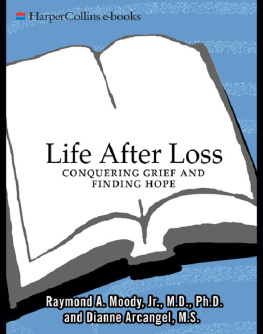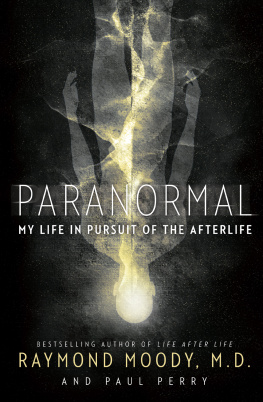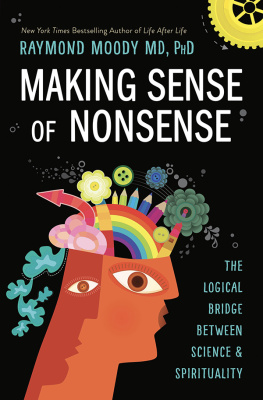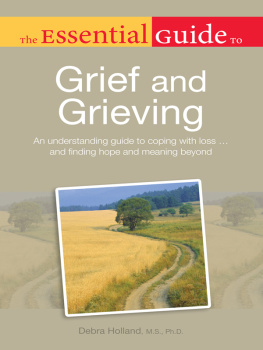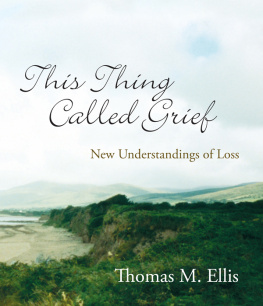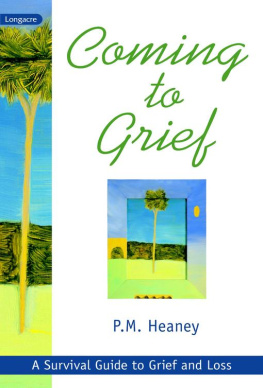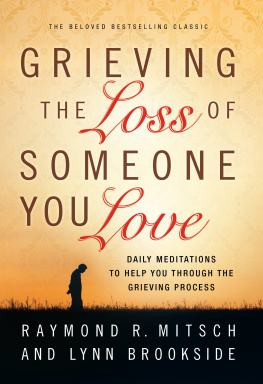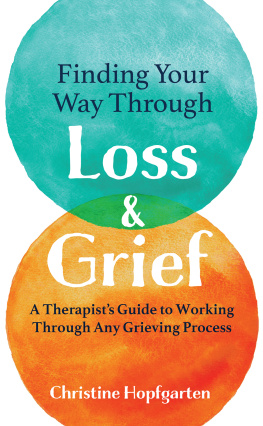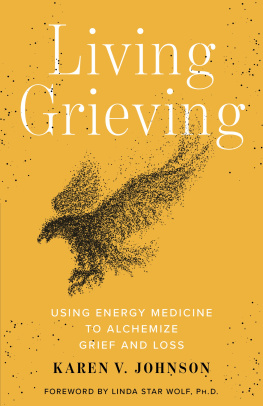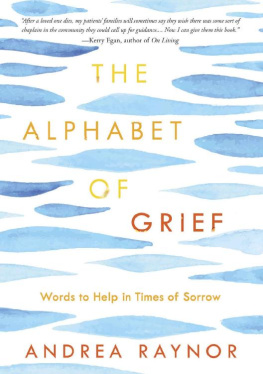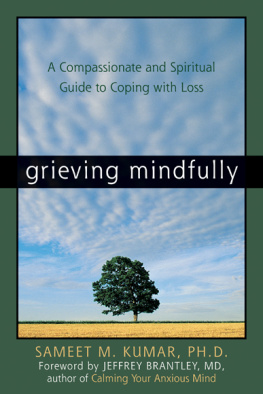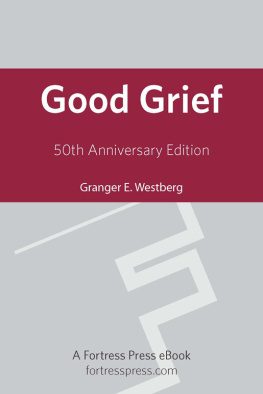Raymond Moody - Life After Loss: Conquering Grief and Finding Hope
Here you can read online Raymond Moody - Life After Loss: Conquering Grief and Finding Hope full text of the book (entire story) in english for free. Download pdf and epub, get meaning, cover and reviews about this ebook. year: 2009, publisher: Harper Collins, genre: Science. Description of the work, (preface) as well as reviews are available. Best literature library LitArk.com created for fans of good reading and offers a wide selection of genres:
Romance novel
Science fiction
Adventure
Detective
Science
History
Home and family
Prose
Art
Politics
Computer
Non-fiction
Religion
Business
Children
Humor
Choose a favorite category and find really read worthwhile books. Enjoy immersion in the world of imagination, feel the emotions of the characters or learn something new for yourself, make an fascinating discovery.
- Book:Life After Loss: Conquering Grief and Finding Hope
- Author:
- Publisher:Harper Collins
- Genre:
- Year:2009
- Rating:5 / 5
- Favourites:Add to favourites
- Your mark:
- 100
- 1
- 2
- 3
- 4
- 5
Life After Loss: Conquering Grief and Finding Hope: summary, description and annotation
We offer to read an annotation, description, summary or preface (depends on what the author of the book "Life After Loss: Conquering Grief and Finding Hope" wrote himself). If you haven't found the necessary information about the book — write in the comments, we will try to find it.
Life After Loss: Conquering Grief and Finding Hope — read online for free the complete book (whole text) full work
Below is the text of the book, divided by pages. System saving the place of the last page read, allows you to conveniently read the book "Life After Loss: Conquering Grief and Finding Hope" online for free, without having to search again every time where you left off. Put a bookmark, and you can go to the page where you finished reading at any time.
Font size:
Interval:
Bookmark:
To you, the reader
When archaeologists recently examined a Neanderthal grave that was more than forty-four thousand years old, they found traces of ancient pollen from hyacinth and hollyhock flowers, apparently the remnant of a garland left by a mourner. It was a poignant reminder that grief, loss, and bereavement have been part of the human experience for a very long time.
Some say this will change. Experts are predicting a sensational increase in human longevity in the near future. There is heady talk about postponing death indefinitely, as scientists unravel the mysteries of aging. So far, however, the statistics are compellingeveryone dies, no exceptionswhich means that the primal sense of loss is unlikely ever to be eradicated.
Although death remains a constant, our attitudes toward it are changing. One of the most significant developments in Western cultures during the twentieth century was our increased willingness to confront death openly. Books on death and dying are best-sellers. Courses in death mentoring and compassionate care for the dying have become standard fare in medical schools, hospitals, and secular institutions. Hospice care of the dying is helping medicine reestablish contact with its spiritual roots. Talk of a natural, good, peaceful, and graceful death abounds. Baby boomers, now in their fifties, who once wrote their own wedding vows, are now writing their funeral scripts in an attempt to personalize their departure and ease the grief of those left behind.
One reason for these developments is the recognition that painful emotional experiences such as grief and loss can best be dealt with by entering them fully instead of ignoring them or burying them in the unconscious mind. As Buddhism says, Welcome everything, push nothing away. This is where Moody and Arcangels Life After Loss excels. There is no better practical guide for confronting pain and loss than their fine book. They write from personal insight and experience, and they have immense wisdom to share.
During the reign of materialistic science in the past two centuries, it became fashionable to consider human consciousness the equivalent of the brain. This meant that, with the death of the brain and body, consciousness was annihilated and total personal destruction was assured. This view not only deepened the experience of grief and loss for survivors; it reminded them of their own impending destruction as well. Today, however, many lines of evidence suggest that we must rethink the assumption that mind equals brain. The reason, in a nutshell, is this: scientific evidence shows that consciousness can do things that brains cannot. Quite simply, brains and consciousness are not the same.
In his investigation of near-death experiences (NDEs), Raymond Moody, Jr., has illuminated some of the evidence suggesting that consciousness may transcend the physical brain and body. Like the academic philosopher that he is, Moody is careful not to overstate the case for the survival of consciousness. Yet hope for survival is clearly in the air.
When we speak of grief and loss, what, actually, is lost? The physical body obviously dies, but what about consciousness? John Searle, one of the most distinguished philosophers in the field of consciousness studies, has said, At our present state of the investigation of consciousness, we dont know how it works and we need to try all kinds of different ideas. These observations show that we are appallingly ignorant about the nature of consciousness, the relationship of mind and brain, and the origin and destiny of consciousness. It is important to acknowledge our ignorance, because this permits a greater openness to the new views of consciousness and perhaps for survival.
We are entering a renaissance in which scholars are investigating how consciousness operates beyond the brain.
Why emphasize these developments? Nothing, I believe, could be more important in annulling the sting of death and the sense of loss and grief following the death of loved ones.
I love the ambiguity of this books title, Life After Loss . Life for whom? For those who remain? For the deceased? My answer is: life for both .
Many people still believe that grief and loss are brute experiences that must be borne in isolation, solitude, and silence. Life After Loss demonstrates that this assumption is wrong. Practical steps can be taken to diminish the pain of grief, mourning, and bereavement, as the authors show.
This book is a work of love and caring, and only someone capable of deep compassion could have written it. The authors deserve our collective gratitude for nudging us toward the realization that, although we cannot annul death, that is not the final chapter for those who remainnor, perhaps, for the departed as well.
L ARRY D OSSEY , M.D
I want to express my deep appreciation to all the special people who have come to me seeking solace for their losses, I thank them for what they have taught me about the process of grief, and about the importance of love.
And I so appreciate my friend Dianne Arcangel, and treasure our association and friendship through the years. Thanks so much, Dianne, for your kindness and forbearance during this project.
Many Thanks to my wonderful wife Cheryl, and our children Carter and Carol Ann, for providing time and inspiration for me to work on this project. And thanks to all the great people at HarperSanFrancisco, including David Hennessy and Terri Leonard, for their support and interest.
R AYMOND A. M OODY P H D, M.D.
Acknowledgment from Dianne Arcangel
Please put your words in writing, bereaved families have requested over the years. Id like to have them to read on difficult nights. To those who have waited so longthank you for your patience and for being the catalysts for Life After Loss .
Acknowledgments go to Raymond Moody and his wife, Cheryl, for asking me to make this book a joint venture and for taking the initial steps that commenced the writing in October, 1997. I especially appreciate Raymonds willingness to share his personal life with our readers.
From the conception of this book, agent Nat Sobel believed in and contributed. His support graces every page. Appreciation also goes to Nats remarkable staff Laura Nolan, Anna Bliss, and Catherine Crawford at SobelWeber, Inc.
Although this book lists two authors, many individuals joined ranks with one intentionto offer their loving support to you. I was humbled by the graciousness of many of my professional colleagues. Sonja Earthman and Charles Novo enthusiastically jumped in from the very beginning and contributed every way they could. Their insight added depth throughout the project. Bruce Greyson unselfishly provided data, suggestions, editorial comments, and a great deal of emotional support. To list every professional would be daunting; however, certain others contributed in a special way: April Reckling, Cara McElhaney, Carmen Martinez, Colin Caffell, Diego De Leo, Donna Medford, Elaine Stillwell, Gary Rosen, Geri Colozzi Wiitala, Jarrett Huffman, Jerrod Daigle, Jim Monahan, Jo Ann Thomas and staff at the Gateway Center, Josephine Caragdine, Pam Kircher, Rhea White, Robert Neimeyer, Rupert Sheldrake, Ruth Landaur, Sally Feather, Sheldon Rubenfeld and his staff at The Thyroid Society for Education and Research, and Tom Golden. My colleagues at the Association for Death Education and Counseling, the American Association of Suicidology, American Cancer Society, and The Hospice at the Texas Medical Center immediately provided support every time they were asked, as did the staff at Earthman Funeral Homes, Scott and White Hospice, Pasadena Public Library, and World Health Organization.
Many friends, each in his or her unique way, offered their support to you as well: Billie Mackrill, Bob Bigelow, Carol Poole, Connie Carey, Luanne Valkner, Monica McCormick, Rick Kelly, Terry Huber, and Tod Steiner. To those who asked that their last names remain anonymous, thank you Betty, Elaine, Gail, Gary, Jerry, Jimmie, Joe, John Paul, Lottie, Pam, Ruth, and Tanya.
Font size:
Interval:
Bookmark:
Similar books «Life After Loss: Conquering Grief and Finding Hope»
Look at similar books to Life After Loss: Conquering Grief and Finding Hope. We have selected literature similar in name and meaning in the hope of providing readers with more options to find new, interesting, not yet read works.
Discussion, reviews of the book Life After Loss: Conquering Grief and Finding Hope and just readers' own opinions. Leave your comments, write what you think about the work, its meaning or the main characters. Specify what exactly you liked and what you didn't like, and why you think so.

